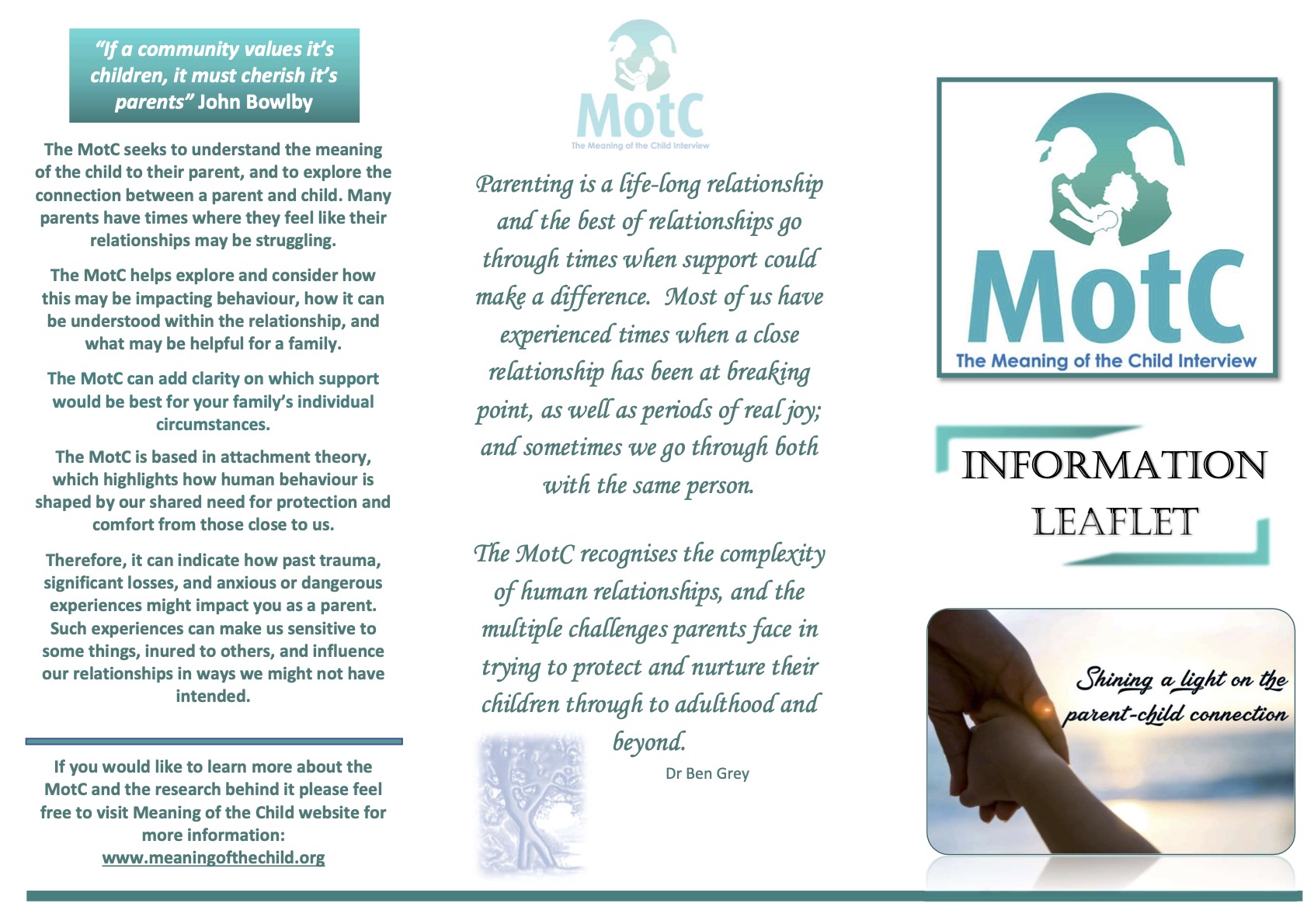What is the MotC?
The Meaning of the Child (MotC) explores the nature of your connection to your child by carefully analysing an interview with you using a standardised method.
Click here for a leaflet on the Meaning of the Child
Our relationship with our child may be our most enduring, deeply-felt relationship, but too often it is treated simply as if it were another task or job we do. The Meaning of the Child explores the range of feelings, thoughts, stories and experiences that make up your relationship with your child(ren). The MotC tries to understand the impact of your child and parenting on you, and how that might in turn shape your experience of your child, and s/he of you. The MotC also explores the parenting you received, and what you want for your child that might be the same or different from what you experienced. The interview includes your other relationships, and their impact upon your relationship with your child.
The MotC can be helpful in helping understand areas that you and your child may be struggling in, as well as highlighting the resources in your relationship, and any points of joy and connection.
How does it work?
The process involves a semi-structured interview, which means you are asked set questions about your child and your own experiences of being a parent, whilst also allowing you room to explore your thoughts and feelings about your relationships more deeply. The set questions give the interview a standard structure that allows it to be informed by current science, whilst still offering freedom for you to explore what matters to you.
The interview takes approximately 1-1½ hours, is typed up and then sent to someone trained and certified in the MotC coding analysis. A benefit of the MotC being analysed in this way is that it offers a systematic and impartial view of key elements of a parent-child relationship; a fresh look from someone not influenced by other factors about your life and situation. This is then discussed with the referrer to ensure accuracy, and a summary prepared that is shared with you (verbally or in the form of a report). This can take a few weeks; the service who is conducting the MotC with you should clarify the timescale and process for hearing back.
What does it look for?
The MotC seeks to understand the meaning of the child to their parent, and to explore the connection between a parent and child. Many parents have times where they feel like their relationships may be struggling. The MotC helps explore and consider how this may be impacting behaviour, how it can be understood within the relationship, and what may be helpful for a family.
The MotC is based in attachment theory, which highlights how human behaviour is shaped by our shared need for protection and comfort from those close to us. Therefore, it can indicate how past trauma, significant losses, and anxious or dangerous experiences might impact you as a parent. Such overwhelming events can make us sensitive to some things, inured to others, and influence our relationships in ways we might not have intended.
A MotC considers aspects that are working well for a relationship, as well as difficulties. It can indicate how the relationship is working for both you and your child. It gives an indication of the level of support you and your child might need. Parenting is a life-long relationship and the best of relationships go through times when support could make a difference. Most of us have experienced times when a close relationship has been at breaking point, as well as periods of real joy; and sometimes we go through both with the same person. The MotC recognises the complexity of human relationships, and the multiple challenges parents face in trying to protect and nurture their children through to adulthood and beyond.
Therefore, where the word ‘risk’ is used, this is not an judgement of you as a parent or individual, but rather how much you and your child might need support to make things work for you both. Categories range from from ‘critical’, highlighting the importance of intensive support right now, through to ‘collaborative’, suggesting that the relationship is working well and pleasurably for you both. These allow professionals to tailor their work to ensure that relationships get the right kind of support at the right time.
Why have I been asked to have a MotC or How do I get a MotC?
Often a MotC is requested by professionals working with families, such as social workers, psychologists or therapists. It may have been referred as part of an assessment, such as for adoption, or perhaps to help understand what intervention would be beneficial for you and your family. Where intervention may be needed, the MotC can be helpful in understanding which support would be best for your family’s individual circumstances.
Where it has been requested as part of a court directed assessment, the MotC allows for a greater depth of analysis and helps offer a clear picture of the parent-child relationship. The MotC does not seek to diagnose risk or pathology in individuals, but rather to understand the context and complexities of key relationships. Therefore, the MotC can help offer insights on how this is working parent and child, and, when integrated with other information and evidence, contribute to decision making. It should never be used in isolation to make decisions about the future of a child or family, but can help make sense of all the information at hand, or highlight areas that might have not have been fully considered.
Occasionally a parent may wish to have a MotC, for example, where there may have been a disruption during the child’s early years or they are worried about an aspect of their family dynamic and would like to gain a deeper understanding of their relationship.


